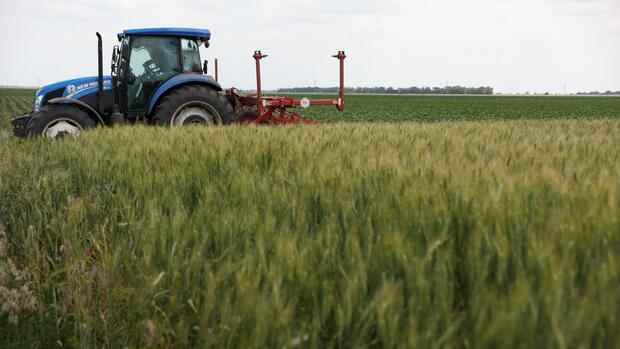Berlin The German agricultural traders are calling for concerted action by politicians and business to organize grain exports from the Ukraine at the beginning of the harvest season and to ensure food production for the next few years.
Many member companies are already in contact with agricultural businesses and trading companies in the Ukraine “and are trying to organize transport, to unload the different types of trucks, rail wagons or containers and to process the payment modalities,” reports the Federal Association of Agricultural Trade together with the Association of Agricultural Trade Grain trader of the Hamburg Stock Exchange. You wrote a letter to the Federal Ministers Volker Wissing (transport), Robert Habeck (economy), Christian Lindner (finance) and Cem Özdemir (agriculture).
“Unfortunately, the companies in the value chain, from the agricultural businesses in Ukraine to the operators of the port terminals, encounter problems that they cannot solve on their own,” it continues. Therefore, as recommended by the EU Commission, the federal government should set up a “national coordination office”.
Ukraine is considered the breadbasket of the world. In view of the Russian war of aggression, however, the Ukrainian agricultural economy can no longer use the important seaports on the Mediterranean for exports. New routes over land have to be opened up, but also trucks and grain wagons have to be organized for trains.
Top jobs of the day
Find the best jobs now and
be notified by email.
The European Commission has already launched an initiative. This includes a platform to match Ukrainian grain sellers with logistics companies and traders. The federal government wants to build a “grain bridge”.
The federal government wants to give Hermes guarantees for transports
“We are working flat out to ensure that the grain can be transported from Ukraine by rail in order to prevent global famine,” said the federal government’s rail commissioner, Michael Theurer (FDP).
A fund for wagons is under discussion. There should also be Hermes guarantees for transporters. There could also be help to set up reloading terminals on the border with Ukraine, since the railways there use wider rails. The railways are supposed to transport up to ten million tons in this way.
According to EU Transport Commissioner Adina Valean, the logistics are a major challenge: a 600-meter train can transport around 1,900 tons of grain, and a barge around 3,000 tons. The aim is to transport 20 million tons of grain from Ukraine in order to free up the warehouses for the new harvest.
>> Also read here: Dispute over grain blockade: Kyiv does not see Turkey as an honest mediator
From the point of view of the Association of Agricultural Traders, the coordination center should activate grain wagons. She should also ensure that the wagons are given preferential treatment in the railway repair shops.
The Federal Railway Authority should ask companies to report free capacities. “If grain wagons are the bottleneck resource, everyone involved must make mainline locomotives, shunting locomotives and unloading slots available without delay.” Older wagons that are not equipped with a new type of whisper brake should also be allowed to drive. “According to our information, these are available in large numbers in other parts of Europe.”
The association advocates speeding up clearance at the EU’s external borders. There, trucks with grain should be given priority. There are currently waiting times of up to three days at the borders, reports Association President Rainer Schuler.
Since the trucks are busy in the summer with driving grain from the field to the warehouse, the federal government should increase the permissible total weight of trucks from 40 to 44 tons. According to his own statements, he is examining the request with the federal states.
“This could cushion the impending bottlenecks in logistics capacities during the German and European grain harvest, since mathematically every seventh trip would be saved,” explained the association. In addition, the trucks with the Euro II emission standard, which are still widespread in Ukraine, should be allowed to drive in the EU for a limited period of time. “With a time-limited exemption, Ukrainian trucks could head directly for the ports on the Baltic Sea.”
Many construction sites on the route of the railways
In view of the construction site chaos of the last few months, it is questionable how many additional trains can run on the network. The state-owned company Deutsche Bahn AG is trying to help through its freight transport subsidiary: “We do everything we can do as a company out of social responsibility,” said a spokesman.
“With our European DB Cargo subsidiaries in Poland and Romania, we are already running several trains a day with grain through Europe to various seaports. Now it is a question of expanding these agricultural exports.” The goal is stable connections to the seaports of the North Sea and the Black and Mediterranean Seas.
>> Also read here: How global hunger crises work
The managing director of the network of European railways (NEE), Peter Westenberger, emphasized: “All railways and all means of transport must shoulder this task.” The railway group is not able to do this alone.
Above all, DB Netz is required as the operator of the rail network: According to information from the NEE, grain trains with around 2500 tons of cargo normally travel from Hungary, Romania and the Ukraine via Bad Schandau in Saxony to northern and western Germany and the Netherlands and Belgium.
However, construction work on the rail corridor meant that trains could hardly run flexibly. The only alternative via Passau in Lower Bavaria is also closed due to construction work near Würzburg.
“In the special situation, construction projects have to be checked even more carefully, and perhaps it has to be considered occasionally to postpone planned construction measures again or to modify them with a view to capacity, for example through temporary bridges or by installing construction switches,” demanded Westenberger.
More: Why Deutsche Bahn and shipping are reaching their limits in an oil embargo
